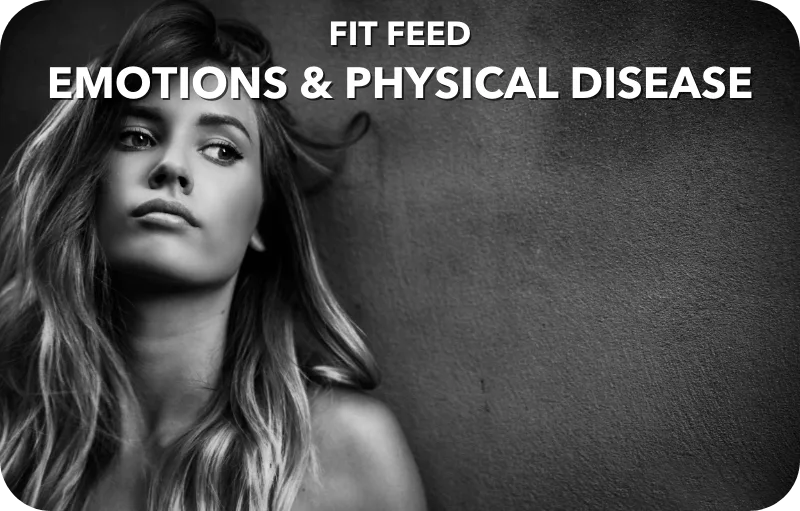The Surprising Link Between Emotions & Physical Disease

Emotions are more than just fleeting feelings; they play a crucial role in our overall health.
When emotions are not properly processed, they can have significant consequences for physical well-being.
Understanding the connection between unprocessed emotions and physical disease is essential for maintaining holistic health.
This article explores how unprocessed emotions can manifest as physical ailments and offers practical tips for effective emotional processing.
The Mind-Body Connection
The mind and body are deeply interconnected. Emotional and psychological stress can trigger physical responses in the body, influencing various aspects of health.
Stress Response: When emotions like anger, sadness, or fear are not processed, they can activate the body’s stress response. This involves the release of stress hormones such as cortisol and adrenaline, which, when chronically elevated, can contribute to various health issues.
Immune System Impact: Chronic emotional stress can weaken the immune system, making the body more susceptible to infections and diseases. Stress hormones can suppress immune function, reduce the body’s ability to fight off pathogens, and increase inflammation.

Common Physical Diseases Linked to Unprocessed Emotions
Cardiovascular Issues
High Blood Pressure: Prolonged stress and unprocessed emotions can lead to persistent high blood pressure. This is due to the continuous release of stress hormones that constrict blood vessels and increase heart rate.
Heart Disease: Emotional stress is a known risk factor for cardiovascular diseases. Chronic stress and unresolved emotional issues can contribute to the development of conditions like coronary artery disease and heart attacks.
Gastrointestinal Problems
Irritable Bowel Syndrome (IBS): Emotions such as anxiety and stress can exacerbate gastrointestinal issues like IBS. The gut-brain axis, a direct link between the gut and the brain, plays a role in how emotional stress affects digestive health.
Ulcers and Gastritis: Emotional stress can increase stomach acid production and impair the mucosal lining of the stomach, leading to ulcers and gastritis.
Musculoskeletal Disorders
Chronic Pain: Unprocessed emotions, particularly stress and trauma, can contribute to chronic pain conditions. This includes tension headaches, back pain, and muscle soreness, often linked to prolonged muscle tension and inflammation.
Fibromyalgia: This condition, characterised by widespread pain and fatigue, has been associated with emotional stress and trauma. Emotional factors can exacerbate symptoms and contribute to the development of fibromyalgia.
Autoimmune Diseases
Increased Inflammation: Chronic emotional stress can contribute to inflammation, which is a key factor in autoimmune diseases. Conditions such as rheumatoid arthritis and lupus may be influenced by emotional factors that trigger or worsen autoimmune responses.
Disease Flare-Ups: Emotional distress can lead to flare-ups in autoimmune conditions by disrupting immune system balance and increasing inflammation.
Skin Disorders
Acne and Eczema: Emotional stress can exacerbate skin conditions such as acne and eczema. Stress-induced hormonal changes and inflammation can aggravate these skin issues.
Psoriasis: This chronic skin condition, characterised by red, scaly patches, can be triggered or worsened by emotional stress. Stress can impact immune function and inflammation, contributing to psoriasis flare-ups.
Tips for Thoroughly Processing Emotions

Practice Mindfulness and Meditation
Mindfulness Meditation: Engage in mindfulness meditation to increase awareness of your emotions and cultivate a non-judgmental attitude towards them. This practice helps you observe and understand your emotions without becoming overwhelmed.
Breathing Exercises: Use deep breathing techniques to calm your nervous system and create a space for processing emotions. Slow, deep breaths can help you relax and gain clarity on your emotional state.
Journaling
Emotional Journaling: Keep a journal to write about your feelings, experiences, and reactions. Journaling helps you process and articulate your emotions, providing insight into underlying issues and patterns.
Gratitude Journaling: Incorporate gratitude journaling to shift your focus to positive aspects of your life. This practice can balance emotional processing and promote a more positive mindset.
Seek Professional Support
Therapy: Consider working with a licensed therapist or counselor to explore and process unresolved emotions. Therapy provides a safe space to address emotional issues and develop coping strategies.
Support Groups: Join support groups or workshops focused on emotional well-being. Sharing experiences with others can provide validation and support while helping you process emotions.
Physical Activity
Exercise: Engage in regular physical activity to release endorphins and reduce stress. Exercise helps improve mood and alleviate physical tension associated with unprocessed emotions.
Body-Based Therapies: Explore therapies such as yoga, tai chi, or massage. These practices can help release physical tension and promote emotional healing.
Healthy Lifestyle Choices
Balanced Diet: Maintain a nutritious diet to support overall health and emotional well-being. Nutrient-rich foods can positively impact mood and energy levels.
Adequate Sleep: Ensure you get enough quality sleep to support emotional and physical health. Proper rest helps regulate mood and reduces stress.
Develop Healthy Coping Mechanisms
Creative Outlets: Engage in creative activities such as art, music, or writing to express and process emotions in a constructive manner.
Relaxation Techniques: Incorporate relaxation techniques like progressive muscle relaxation or guided imagery to help manage stress and emotional tension.
Conclusion
Unprocessed emotions can have a profound impact on physical health, contributing to a range of diseases and disorders.
By acknowledging and addressing these emotions, you can improve both your emotional and physical well-being.
Incorporating practices such as mindfulness, journaling, therapy, physical activity, and healthy lifestyle choices can help you process emotions thoroughly and reduce their potential negative effects on your body.
Prioritizing emotional health is essential for achieving a balanced, healthy life.



